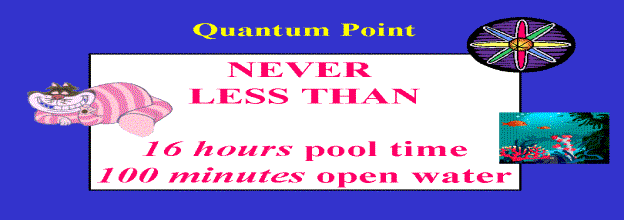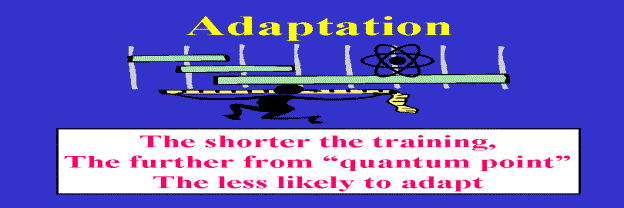
The "Primitive Brain"
by
Larry "Harris" Taylor, Ph.D.
This
editorial is based on comments made to my scuba students during initial aspects
of pool training.
This material is copyrighted and all rights retained by the author. This article
is made available as a service to the diving community by the author and may be
distributed for any non-commercial or Not-For-Profit use.
All rights reserved.
Go To: Home About "Harris" Articles War Stories Editorials Links Fini
Every one of us has what I call
the "primitive brain" (that part of the human nervous system dedicated
to our survival). Over the course of time, humans have evolved into thriving
land dwelling, air-breathing creatures. As "land critters," all our
instincts, reflexes and responses to stress are based not only on our individual
accumulated experiences, but also upon the millions of years we have taken as a
species to successfully become accustomed to dwelling on land. When we enter the
water, visual perception is altered, movement is awkward, we chill, and
over-riding all is the feeling deep inside our gut that we are trespassers in a
world where we will die without awkward, heavy mechanical contraptions. It is a
world where all our accumulated experiences, land-based instincts and survival
skills seem inadequate.
Every time we place our face
underwater, our "primitive brain" (which, for the most part, is beyond
conscious control) begins sending a "survival alert" to our conscious
self. Since our land-based survival instincts are strong, the "primitive
brain" shouts things like,
"I don't breathe water"
"I cannot survive
here"
"I am NOT
comfortable"
"Get me out of here!"
"If we do NOT find air soon, WE WILL DIE!"
So, as we first take our
"primitive brain" underwater, there is apprehension. This is NORMAL
(our land based stay-alive instincts are telling us we do not breathe water).
Thus, in teaching scuba, we are doing more than imparting a skill or two, we are
conducting behavioral modification to educate the student's
"primitive brain" to allow them to play in an environment they
cannot breathe. Taken to its extreme, scuba classes are "courses in
self." For some, it may be the first ever
"I can do this," type experience.
I often hear, particularly on
the Internet, that someone who has "panicked" and bolted to the
surface was stupid (or a whole host of other derogatory descriptors). The
injured diver did not "escape to the surface" because they were
stupid, they moved to the surface because they were human! Their natural,
human biology told them that they were in an atmosphere they could NOT breathe
and their "primitive brain" driven land-survival instincts said,
"Take me to the air I have breathed throughout all of my life!"
The "primitive brain" KNOWS there is air on the surface. It
takes much in-water training time for the "primitive brain" to learn
that air can be obtained from this mechanical thingy in the mouth. In other
words, the "panicked" diver had NOT BEEN ALLOWED the time it
takes for humans to learn basic survival skills in an environment hostile to
life (you do NOT breathe water!) So,
we should be indicting the training, not the diver, because the diver only
acted in a natural fashion as a human being faced with a perceived extreme
life-threat.

Our goal in a scuba class is to
educate this "primitive brain" so that IT understands that it
is not only possible to survive underwater immersion, but that being warm and
weightless is a unique, special thrill AND scuba diving is an enjoyable means
to obtain this most sensual pleasure. To do this takes time because we are
attempting to overcome those land-critter-based "keep-me-alive"
instincts (like "escape to the surface"), which may be contrary
to survival in the underwater realm. No human being can overcome these
evolutionary derived survival instincts in merely a couple of pool sessions.
The biggest "enemy"
for the student in a scuba class is not the water, nor even the instructor. It
is the "I can't do this reflex" that originates between the ears of
the student. This "I can't do
this-it-is-impossible-for-a-land-critter-reflex" is eventually replaced
with "Wow! I CAN DO THIS!" and "Wow! This is fun!" This
sense of accomplishment is not a trivial thing. It comes from "within"
and can only occur with time and ACCOMPLISHMENT!
Single trial learning is generally NOT a successful teaching strategy.
Thus, scuba training must involve a series of successful repetitive tasks,
each slightly more complex that allow the student to gradually develop a new
set of reflexes and skills more appropriate to functioning underwater. Sometimes
doing the "impossible" is merely being given an opportunity to
try.
Whenever I hear a scuba instructor say, "It is too complex a task to teach," I translate this to "I am too greedy to take the time to teach you this skill for the fee paid," or "My training was too superficial. I, myself, cannot do this skill!"
The "primitive brain"
is not influenced by shallow praise and market-oriented flattery. Nor does the
"primitive brain" understand the color or number of patches worn. The
"primitive brain" on its first exposure to scuba does NOT believe
"you are a natural." (Since
the "primitive brain" is responsible for individual survival,
superficial matters cannot sway it) The
"primitive brain" can only be influenced by the comfort that comes
from accomplishment. It is the old stand-by of human behavior that people take
pride in things they have earned. (I.e.
the "primitive brain" knows the difference between "earned"
and "bought") and it is the "earned" that will keep divers
alive when normal human imperfections and the environment combine to create
potential life-threat scenarios not encountered in pool training.)
In every basic class I have
taught, I see something I define as the "quantum point." (Quantum from
the chemical principle that suggests a significant and distinct alteration has
occurred) I define this "quantum point" as the first time I see a
student leave a pool session with a Cheshire cat grin. Like someone in love,
they just "glow." As an instructor, the student's grinning behavior
tells me the student feels comfortable, has developed a sense of accomplishment
and is beginning to feel a mastery of the environment. In other words, the
student's "primitive brain" is beginning to understand the underwater
world can be both survivable and enjoyable.

As a biochemist, the Cheshire
cat grin suggests to me that the student is dumping endorphins, the body's
endogenous opioid, an analgesic and euphoric. It may also suggest the beginning
of the appearance of delta fos, a compound which takes weeks to induce, believed
to be implicated in compulsive behaviors (the animal model uses compulsive
running to study this compound.)
Ask people who repeatedly participate in activities like aerobics, cycling, rowing, running, spinning, etc. and they will tell you one of the reasons they continue to repeat their activity is because it "makes me feel good" or more often, "I get high!" The Barefoot Man said it best when he sang, "I get high by going down!"


The level of beta-endorphins
has been shown to increase at depth in the plasma levels of experienced divers
(i.e. The "diver's high" is real and probably has the same biochemical
basis as the "runner's high" or "exerciser's high.") Since
this compound is an endogenous analgesic, I believe that the presence of
endorphins in the blood is one component to the observation that divers at depth
show an increased tolerance to pain.
If we, as scuba educators, seek
to increase the level of participation of our students in our sport, over the
long term, then we should be seeking a level of student comfort and performance
that "let the endorphins flow!" Although I see the quantum point in
every student (in every basic class), I have never seen it in less than week
eight (2 hours per week) of a fifteen-week program. There is a second quantum
point that occurs in open water. This, to me, is the critical one. It is the one
that suggests the student's "primitive brain" is comfortable enough in
the new environment to want a repeat encounter. I have never seen this second
quantum point in less than 100 minutes of in-water bottom time during that first
weekend of diving (which is why I want a 200 minute minimum in-water bottom time
for certification, typically 250-300 minutes).

The first series of
certification open water dives, I believe, is decisive to a new student's
life-long participation in our sport. When they leave that open-water
certification experience, diving should be a new and wonderful adventure. They
SHOULD BE eagerly anticipating their next dive! Unfortunately, in many
cases, the student leaves a hurried, harried exercise in survival. So, instead
of thinking about their next dive, the student may be looking for the nearest
sporting goods store to buy a bicycle or set of golf clubs.
Over the last two decades,
every time there is an economic slump in scuba industry growth, I hear c-card
vendors say, "We must increase participation." This is the most
commonly used excuse for declining standards and the current drive to lower the
age of training. At best, this is "chain-letter thinking" because it
only leads to a short, temporary increase in revenue for the c-card vendors and
equipment sellers as a new population is targeted for sale. I have seen no
evidence to suggest that declining standards decrease the dropout rate. But, by
declaring more and more material as "unnecessary" skills or knowledge,
declining standards and superficial training create a situation that is further
and further away from the "Quantum Point" necessary for the
"primitive brain" to feel comfortable.
So, the more we allow declining standards to control our teaching, the
less likely we are to create a "comfort zone" acceptable to a newly
trained human being. Declining
standards and shorter in-water times needed to certify stand in direct
opposition to everything known about inducing long-term behavioral changes.
Taken to absurdity, eventually there will be no more standards to remove and the
"chain-letter" will terminate.

Our customers are humans, not
merely walking wallets and if the goal truly is to increase long-term
participation in our sport, then we must accept that OUR CUSTOMERS ARE HUMAN and
address their biology! The more we
decrease our standards, the more difficult we make it for our very human
customers to adapt to Planet Ocean to enjoy a lifetime of participation in our
sport. I suggest that decreasing the level of skill and knowledge necessary to
purchase a scuba c-card has not been in the best long term interests of either
the student (diving treatment centers are seeing an increase in injuries
initiated by panic caused from a flooded mask ie. something not seen in days of
longer training classes) or the diving industry. For you see, uncomfortable
"primitive brains" soon take their wallets to other more
"comfortable" recreational activities.
Go To: Home About "Harris" Articles War Stories Editorials Links Fini
About
The Author:
Larry
"Harris" Taylor, Ph.D. is a biochemist and Diving Safety Coordinator
at the University of Michigan. He has authored more than 200 scuba related
articles. His personal dive library (See Alert Diver, Mar/Apr, 1997, p. 54) is
considered one of the best recreational sources of information In North America.
All rights reserved.
Use of these articles for personal or organizational profit is specifically denied.
These articles may be used for not-for-profit diving education